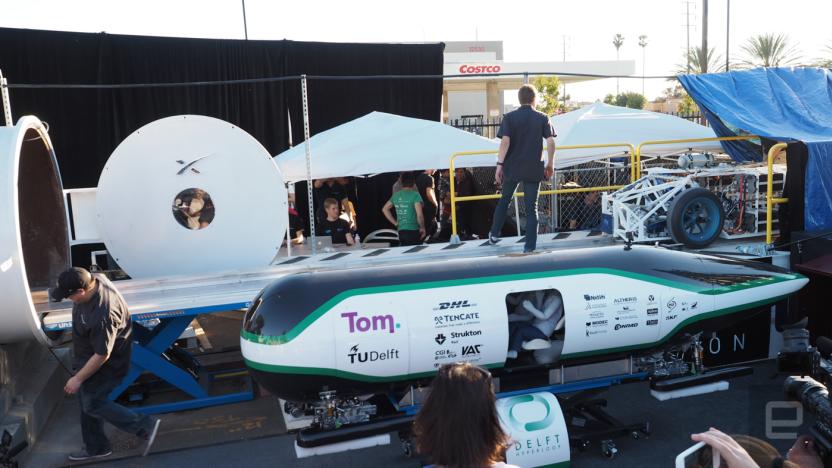Delft
Latest

Watch three teams compete for the best Hyperloop pod design
Last Sunday 27 teams brought their completed Hyperloop pods to SpaceX's headquarters in Southern California hoping to get time in the vacuum-sealed track. After a battery of tests by the judges, only three of the vehicles were deemed worthy of the tube. Engadget caught up with members of groups from MIT, Delft University in the Netherlands and the Technical University of Munich about their pods and the technology behind them.

SpaceX's Hyperloop competition finally puts pods in the tube
"I almost cried the first time it went 50 kilometers per hour." Marleen van de Kerkhof is part of the Delft Hyperloop team from the Netherlands. It's been an eventful 12 months for the crew. After qualifying as finalists at the Hyperloop Pod Competition Design weekend in Texas along with 26 other teams, they had to actually build a working pod. Those sketches, models and 3D renderings filled the Kyle Field Hall of Champions at Texas A&M this weekend, where they sped down the 1.25-kilometer tube SpaceX built next to its headquarters in Southern California.

Biofeedback anti-stress pen: a great idea that's not so great at reducing stress
We've all known for quite some time that the pen is mightier than the sword, and now science has given us a pen that is mightier (sort of) than the stress of that TPS report your boss needs right now. A student at Delft University in The Netherlands will receive his PhD this week for research that led him to create just such a pen. Based upon the obvious premise that people play with their writing utensils when anxious, the pen uses motion sensors instead of more conventional means of stress detection. When the pen detects stressful movements, internal electromagnets provide corresponding counter-motion feedback to stop your nervous tics. During experiments, the pen did diminish test subjects' heart rates around five percent, but according to feedback none of them actually "felt" less stressed. The pen isn't yet commercially available, and given its dubious value as an actual stress reliever, we would look to more satisfying methods to aid the relaxation process.

Mucus-riding robot headed to intestines
While the thought of having anything, much less a robot, crawl around and inspect our intestinal tract is certainly not in the forefront of our minds, Dimitra Dodou from Delft University of Technology in the Netherlands hopes her ideas will change the way colonoscopies are performed. Currently, uncomfortably large tubes or devices known as "wormbots" crawl through the delicate linings of your intestines, typically causing a great deal of discomfort in the process. Dodou's prototype contains a "polymer material" that clings to proteins found in the mucus lining of the gut, but can have its "sticky properties temporarily turned off" when sprayed with water. This two-faced material can be used in "snail-like" transporters that move by alternately gliding forward when it releases water, "sticking around" to control direction, and repeating again until the final destination is reached. By the close of 2006, Dodou hopes to have a camera-equipped version available for trial, which could be quite helpful in taking biopsies. Although we certainly don't intend on going under the knife anytime soon, it's quite comforting to know that Dodou's mucus-riding robot should makes things easier to stomach (ahem) if the occasion arises.


